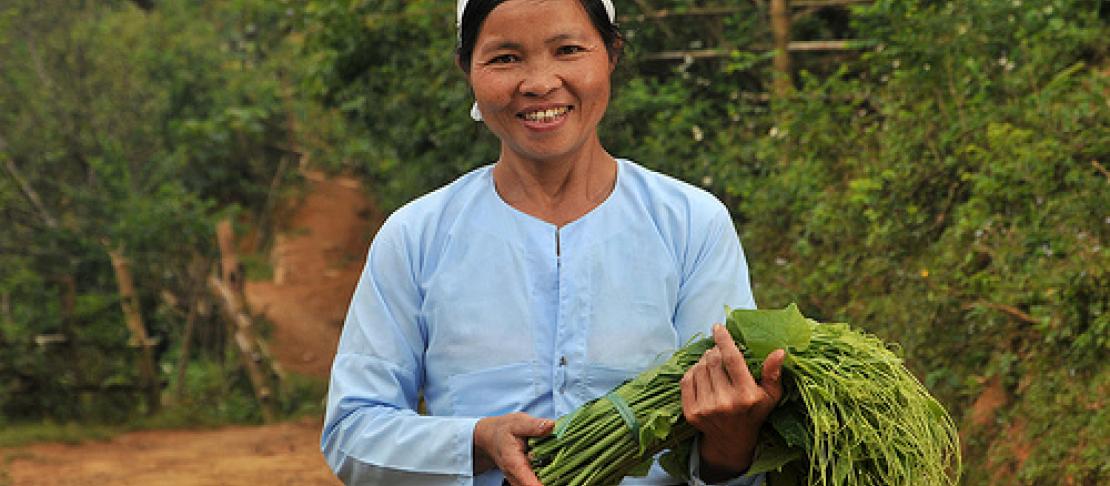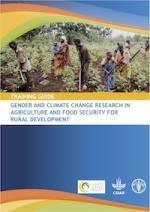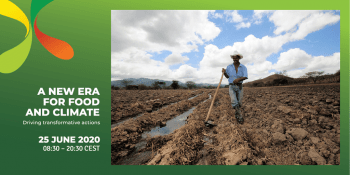Participatory approaches give women a voice in climate adaptation

By Moushumi Chaudhury, reporting from the 6th Community Based Adaptation Conference in Vietnam
The session on gender at the 6th International Conference on Community-Based Adaptation (CBA6) provided an opportunity to share experiences on how gender is being integrated into CBA planning in places such as Vietnam, Micronesia, and Nepal, as well as countries where the CGIAR Climate Change program works, such as Bangladesh, Uganda, and Ghana. A common theme in the papers presented in this session was the use of participatory action research (PAR) tools. In the case of Vietnam and Micronesia, the World Bank and The Nature Conservancy respectively have been using participatory mapping to give women their voice, as well as to collect data on gender, which is rather scarce. Participatory mapping shows not only how men and women perceive risks and disasters differently in Vietnam, but has given women confidence to use three dimensional maps to speak up in cultures where it is difficult to for women to publically engage in discussion in Micronesia.
 To add to the experience of using participatory tools, I presented CCAFS work on gender and climate change based on the results from pilot testing the Gender and Climate Change Research in Agriculture and Food Security for Rural Development training guide, which is based on using PAR tools.
To add to the experience of using participatory tools, I presented CCAFS work on gender and climate change based on the results from pilot testing the Gender and Climate Change Research in Agriculture and Food Security for Rural Development training guide, which is based on using PAR tools.
I shared some of the key findings on communications and research design that could help establish farmer to farmer exchanges based on CCAFS climate analogue work, as well as findings that could help inform PAR on transferring weather forecasts to farmers.
For instance, in order to convince farmers to travel to their analogue site, positive lessons need to exist in analogue sites to create incentives for farmers to visit. Even if farmers are willing to travel, women face a lot more restrictions than men. Therefore, in order to reach farmers who are unable to travel to learn about adaptation practices in analogue sites, other communication mediums need to be considered such as films and announcements in public areas. When it comes to weather forecasts, a key finding was that many farmers are not familiar with universal weather symbols, which suggests that capacity has to be developed among farmers to understand such symbols if we are empower them to use weather forecasts for adaptation planning. Ownership of technology, such as radios and cell phones that help transmit weather information may also influence who has access to such information. In Uganda for instance, radios are men’s property. Therefore, research needs to be conducted on how best to provide weather information to women. To access the key findings, please do see my presentation [insert link to presentation]. My presentation particularly generated interest on the climate analogues work. Read more about climate analogues.
The session ended with a good reminder that not all men and women face vulnerability in the same manner. A case study from Nepal demonstrated that gender has to be further disaggregated by income and caste. Research by Action Aid in Nepal shows that in fact, men and women in higher castes can be more vulnerable to climate change than those in lower castes since those in the upper castes do not diversify their income as much to spread risks in a primarily agriculture based society. This is quite an interesting and unexpected finding since we tend to think that those with wealth would have greater social networks that would allow they them to spread risks. This shows that further interesting research on gender and climate change is definitely called for!
This blog story was written by Moushumi Chaudhury, CCAFS Science Officer, Theme 4.1: Linking Knowledge with Action. Read more stories from the Community Based Adaptation conference and follow us on twitter @cgiarclimate and the CCAFS facebook page for more updates


